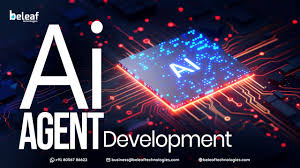This white paper explores the development of AI agents, focusing on their applications in business development, lead generation, and digital marketing. It outlines key resources, including recommended books and courses, and provides concrete use cases to illustrate their potential impact.
White Paper: Developing AI Agents for Business Growth
1. Introduction
This white paper explores the development of AI agents, focusing on their applications in business development, lead generation, and digital marketing. It outlines key resources, including recommended books and courses, and provides concrete use cases to illustrate their potential impact.
2. Key Concepts & Technologies
- AI Agents: Autonomous software entities that perceive their environment, reason, plan, and act to achieve specific goals. They leverage technologies such as:
- Machine Learning (ML): Enables AI agents to learn from data and improve their performance over time.
- Natural Language Processing (NLP): Allows agents to understand and generate human language, facilitating communication and interaction.
- Reinforcement Learning (RL): Trains agents to make decisions by rewarding desired behaviors and penalizing undesired ones.
- Knowledge Representation and Reasoning: Enables agents to represent and manipulate knowledge about the world to make informed decisions.
3. Best Books & Courses
- Books:
- "Artificial Intelligence: A Modern Approach" by Stuart Russell and Peter Norvig: A comprehensive introduction to AI concepts and techniques.
- "Reinforcement Learning: An Introduction" by Richard S. Sutton and Andrew G. Barto: A classic text on reinforcement learning theory and algorithms.
- "Deep Learning" by Ian Goodfellow, Yoshua Bengio, and Aaron Courville: A comprehensive overview of deep learning architectures and techniques.
- Courses:
- Coursera: Offers numerous AI-related courses, including specializations in machine learning, deep learning, and AI for business.
- edX: Provides a wide range of AI courses from top universities, covering foundational concepts to advanced applications.
- Google AI: Offers various online courses and resources on AI, including machine learning, TensorFlow, and ethical AI.
4. Use Cases
- Business Development:
- Market Research & Analysis: AI agents can analyze vast amounts of data to identify market trends, competitor activities, and potential new opportunities.
- Lead Qualification & Prioritization: Agents can assess leads based on various criteria (e.g., company size, industry, budget) and prioritize those most likely to convert.
- Sales Forecasting & Pipeline Management: AI can predict future sales, identify potential bottlenecks, and optimize sales processes for improved efficiency.
- Lead Generation:
- Personalized Outreach: Agents can personalize outreach messages based on individual prospect profiles and preferences, increasing engagement and conversion rates.
- Account-Based Marketing (ABM): AI can identify and target high-value accounts with tailored campaigns, maximizing ROI.
- Social Media Marketing: Agents can monitor social media conversations, identify potential leads, and engage with them in real-time.
- Digital Marketing:
- Content Personalization: AI can analyze user behavior and preferences to deliver personalized content recommendations, improving user experience and engagement.
- Ad Targeting & Optimization: Agents can optimize ad campaigns by identifying the most effective targeting criteria and adjusting bids in real-time.
- Customer Service Automation: AI-powered chatbots can handle routine customer inquiries, freeing up human agents to focus on more complex issues.
5. Benefits of AI Agent Implementation
- Increased Efficiency & Productivity: Automation of repetitive tasks frees up human resources for more strategic activities.
- Improved Decision-Making: AI-powered insights enable data-driven decisions with greater accuracy and speed.
- Enhanced Customer Experience: Personalized interactions and 24/7 availability improve customer satisfaction.
- Competitive Advantage: AI-driven innovation can differentiate businesses and provide a significant edge in the market.
6. Ethical Considerations
- Data Privacy & Security: Ensure responsible data handling and protect sensitive information.
- Bias & Fairness: Mitigate biases in AI models to ensure fair and equitable outcomes.
- Transparency & Explainability: Make AI decision-making processes transparent and understandable.
- Job Displacement: Consider the potential impact on employment and implement strategies for workforce retraining and upskilling.
7. Conclusion
Developing and deploying AI agents can significantly impact business growth across various domains. By leveraging the resources and insights outlined in this white paper, organizations can effectively harness the power of AI to drive innovation, improve efficiency, and gain a competitive edge in the ever-evolving market landscape.
References
- Russell, S., & Norvig, P. (2010). Artificial Intelligence: A Modern Approach. Pearson Education.
- Sutton, R. S., & Barto, A. G. (2018). Reinforcement Learning: An Introduction. MIT Press.
- Goodfellow, I., Bengio, Y., & Courville, A. (2016). Deep Learning. MIT Press.
- Coursera. https://www.edx.org/
- Google AI.
Disclaimer: This white paper provides general information and should not be considered financial or legal advice.
Note: This white paper provides a basic framework. For a more in-depth analysis, consider expanding on specific use cases, discussing the technical challenges involved in AI agent development, and including a more detailed examination of ethical considerations. Contact keencomputer.com or submiit your RFP for details.
